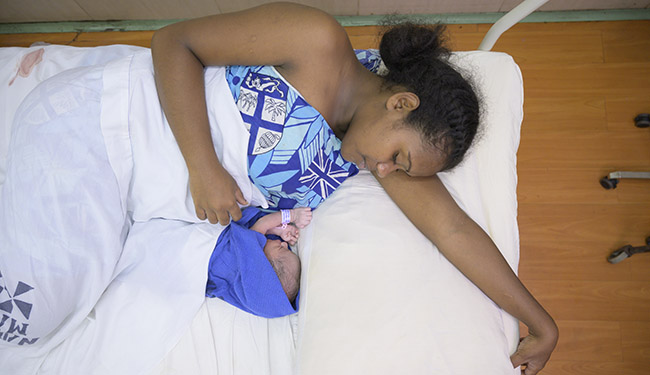
An estimated 161 babies will be born in the Pacific islands* on New Year’s Day, according to UNICEF. As the calendar turns to 2021, UNICEF is again celebrating the new lives being brought into the world on January 1.
Samoa, in the Pacific, will welcome 2021’s first baby. Niue, its last. Regionally, the highest number of births are estimated to take place in three countries: Solomon Islands (53), Fiji (45), and Vanuatu (22).
Statistically, Tonga expects six New Year babies, who may expect to live to the age of 80 years, according to complete estimates on births for 236 countries and territories. This is less than the average expected lifespan of 84.4 years for the world.
Globally, it is estimated that 371,504 babies will be born on New Year’s Day. Their expected life spans range from 61.4 years (Central African Republic) to 110 years (Australia) and 119.2 years (Andorra).
“This has been a difficult year for all of us – a global pandemic and two category five cyclones. There is perhaps no better way to turn the page than to welcome new young lives into the world,” said UNICEF Pacific Representative, Sheldon Yett. “With the challenges of 2020 behind us, and the opportunities of 2021 before us, now is the time to begin to build a better world. Children born today will inherit the world we begin to build for them—today.”
2021 marks the 75th anniversary of UNICEF. Over the course of the year, UNICEF and its partners will be commemorating the anniversary with events and announcements celebrating three-quarters of a century of protecting children from natural disasters, disease and exclusion, and championing their right to survival, health and education.
Today, as the region faces unprecedented challenges caused by the COVID-19 pandemic and the two monstrous cyclones, economic slowdown, rising poverty and inequality, we are reminded that the need for UNICEF’s partnership is as great as ever.
“There is no more appropriate year than this—the year of UNICEF’s 75th Anniversary—to renew our commitment to each other, and to the young lives who will inherit the world we leave,” said Sheldon Yett. “2021 will be a critical year for children, but UNICEF’s three-quarters of a century of delivering results for children around the world are a testament to what we can accomplish together.”
For the estimates, UNICEF used vital registration and nationally representative household survey data to estimate the monthly and daily fractions of births in countries. UNICEF used the annual live births numbers and period life expectancy from the latest revision of the UN’s World Population Prospects (2019) to estimate the babies born on 1 January 2021 and their cohort life expectancy. Countries and territories included based on availability of statistical data compiled and released by regional or national governmental agencies.
In the Pacific, UNICEF works in the Cook Islands, Fiji, Kiribati, Marshall Islands, Federated States of Micronesia, Nauru, Niue, Palau, Samoa, Solomon Islands, Tokelau, Tonga, Tuvalu and Vanuatu.



